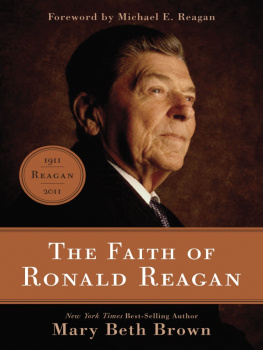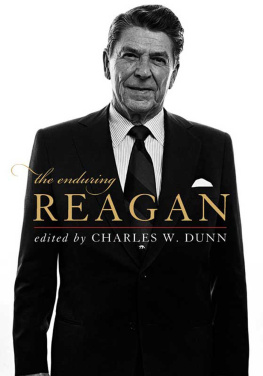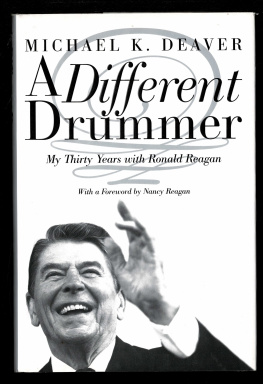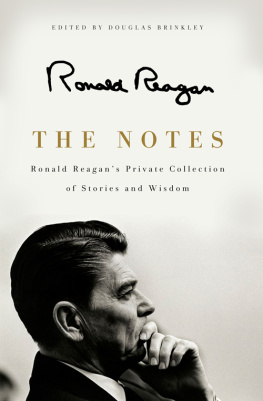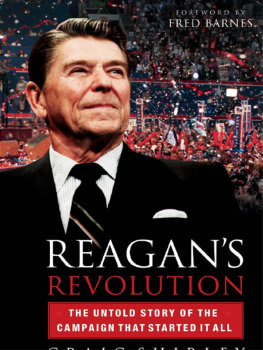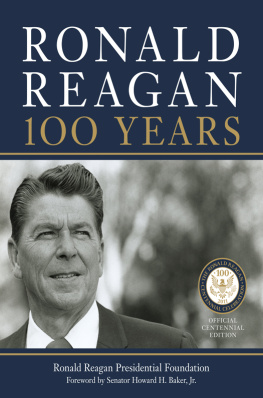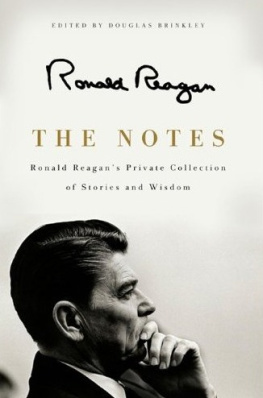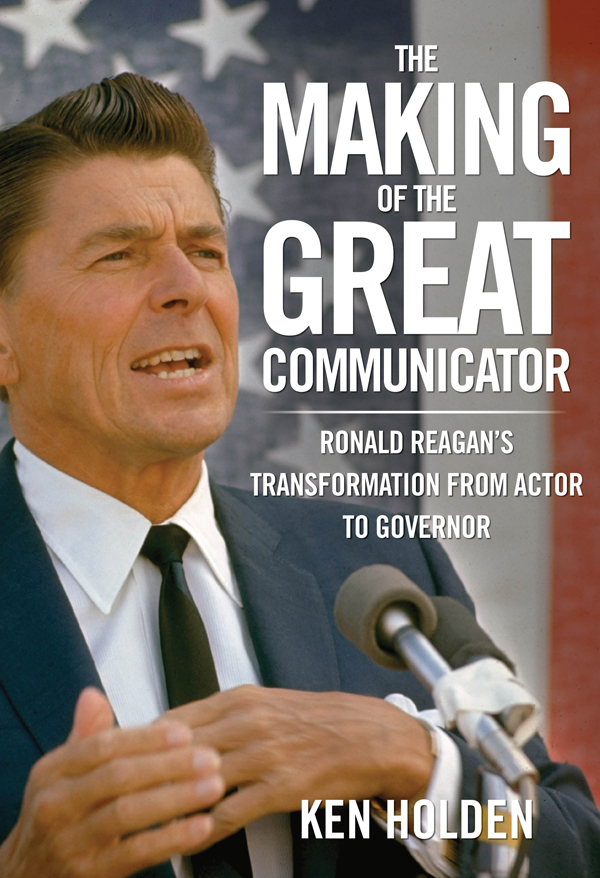
T HE M AKING OF THE G REAT C OMMUNICATOR
T HE M AKING OF THE G REAT C OMMUNICATOR
Ronald Reagans Transformation from Actor to Governor
K EN H OLDEN
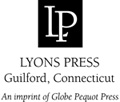
Copyright 2013 by Kenneth Holden
All rights reserved. No part of this book may be reproduced or transmitted in any form by any means, electronic or mechanical, including photocopying and recording, or by any information storage and retrieval system, except as may be expressly permitted in writing from the publisher. Requests for permission should be addressed to Globe Pequot Press, Attn: Rights and Permissions Department, PO Box 480, Guilford CT 06437.
Lyons Press is an imprint of Globe Pequot Press.
All photos courtesy of the author.
Project editor: Meredith Dias
Layout artist: Melissa Evarts
Library of Congress Cataloging-in-Publication Data is available on file.
E-ISBN 978-0-7627-9433-1
For Julie, gone these ten years, but always with me
The men who succeed best in public life are those who take the risk of standing by their own convictions.
J AMES A. G ARFIELD, IN A NOTE KEPT BY R ONALD R EAGAN
C ONTENTS
A UTHORS N OTE
We had him for three days in a tiny beach cottage near Malibu. This was in early 1966. Just three of us in a small beach cottage. An unlikely candidate for governor of California, hed already goofed up a few public appearances. He couldnt seem to get his footing, he looked unprepared, he mangled details. The men who had discovered him and fallen in love with his possibilities were blistering, ready to give up on him. Better a quick writeoff, they were saying. Better wait for the next guy.
But not us, not Stan Plog and I.
We saw right away that he had the goods. He just needed a little push, some direction, what youd now call tweaking. And we were right. He had the gift. He understood immediately, with a kind of intuitive genius, what we were getting at: how to handle himself in front of a crowd, how to manage the press, how to deliver his answers in small, powerful doses. Like a thoroughbred reacting to a gentle touch, almost before the command, he would go where we were going before we had to tell him. He seemed to know before we did.
It was as if he were waiting for us.
Only three people on earth knew the full story of what happened in Malibu over those seventy-two hours, how we helped transform a B-movie actor into a political giant. Thats not too much to claim. His movie career was washed up, and he had limited range on television. But he did have something else. White-hot fire burned inside the man, and he viscerally understood thatunder the right circumstanceshe could connect powerfully with the American people. It was something to see, this priceless candidate being born. When it all came together, when the magic kicked in, it was as if the public had been waiting for him, just as he had been waiting for us.
Ronald Reagan died in 2004, and Stan Plog is just gone, in 2010, so only Im left standing. I know the full story. Im the only one left to bear witness.
P ROLOGUE
Pictures filled the house. Well, this was the home of a movie star. The walls glittered with the long, loving memories of his career: Duke Wayne, Doris Day, Robert Taylor, Pat OBrien, George Murphy, Jack Bennyall smiling their movie-star smiles at us, all with heartfelt dedications to Dear Ronnie, My great pal, Ron, Ronnie, a mans man!
Stan and I were a little awestruck. In early 1966, we were two still-young academics and pioneers in the infant field of behavioral psychology, new to the sharp end of politics. Nevertheless and underneath it allunbeknownst even to ourselveswe were ready for a firefight.
Nancy met us at the door, with that irresistible, soft, sunny smile, welcoming us to her home.
Did you have trouble finding it? she asked.
Pacific Palisades was an enviable location, an ideal destination for successful people, halfway between Santa Monica and Malibu, near the coast. No, it wasnt hard to findjust hard to imagine.
Can I get you something? Please, make yourselves comfortable.
Out of a perfect picture window lay a faultless green golf course, and on the other side of the room, out another window, the azure beauty of the Pacific Ocean. It was a handsome house, an impressive house, a movie stars house. A grand piano held court in the living room, and on it sat a picture of William Holden (no relation, as far as I know). He had been the best man at Ron and Nancys wedding in 1952. It was casually impressivenot showyand it let you know exactly who you were dealing with.
Hes been a little under the weather. Nothing serious, a slight infection.
She took us into the den, a cozy room with a cowboy motif. Big bookcases lined the walls, filled with serious books, about Jefferson, Madison, Adams, and Tom Paine; volumes about Lincoln and Theodore Roosevelt; whole stretches of philosophy: Plato, Aristotle, and Locke. It was a thinking mans library.
Does he read all these books?
Oh, yes, hes up late at night, reading, reading, reading.
Two other guys, both in their forties, were waiting in the den. Lyn Nofziger, the press secretary, an old newspaper hound sporting a sloppy Van Dyke beardhis Mickey Mouse tie half blown and a portable typewriter perched on his laphad a cigar dangling out of his mouth. He had a friendly but careful smile. He was our friend.
Sprawled on the couch was Bill Roberts, the high-priced campaign consultant. Not a dumpy bag of laundry like Nofziger, but expensively rumpled and quietly bad-tempered. He muttered a greeting. Not our friend.
The introductions were unnecessary, but a certain formality obtained.
Stan Plog and Ken Holden, Lyn Nofziger and Bill Roberts.
The meeting had taken only a day to arrangelightning speed in a matter of this scope, but the rush was imperative. This was a true crisis. Everyone knew that the stakes couldnt be higher. So decks were magically cleared, schedules quickly rearranged. The money guys didnt dither, not when it came to the whole ball game.
Nancy stepped out of the room for a second. Roberts was muttering something that sounded like a complaint. Nofziger was chuckling to himself, probably enjoying one of his own bad puns or even worse jokes.
Suddenly everything stopped. We turned, and there he was, standing in the doorway in his casual sports jacket, his perfectly pressed slacks, and his dazzling shy smile: Ronald Reagan. He lit up the room, and we knew exactly why we were there.
P ART O NE
A Star Is Born
Just a month after that introduction in Pacific Palisades, we spent our weekend in Malibu, where Stan and I worked with Ronald Reagan to get him started on the road that would take him through the Republican primary contest, then on to Sacramento as Californias governor, and eventually to Washington as the nations fortieth president, and into the history books. We were among the first pebbles in a landslide that swept the country and changed the world.
But to get to that weekend in Malibu, you have to retrace three pathways, the three very different lives that converged with just one great mission in mind. We were, all three of us, Midwesterners who had followed various dreams to California. Well get to Stans story and mine, but first we need to consider the extraordinary man whose life and ambition brought us all togetherRonald Reagan.
Reagans official birth date is February 6, 1911, but he could have been a day older. His mother, Nelle Reagan, a quiet, deeply religious Protestant, had to endure a grueling and seemingly endless labor in a five-room apartment above a row of shops in Tampico, Illinois, before her son made his grand entrance.
Next page



